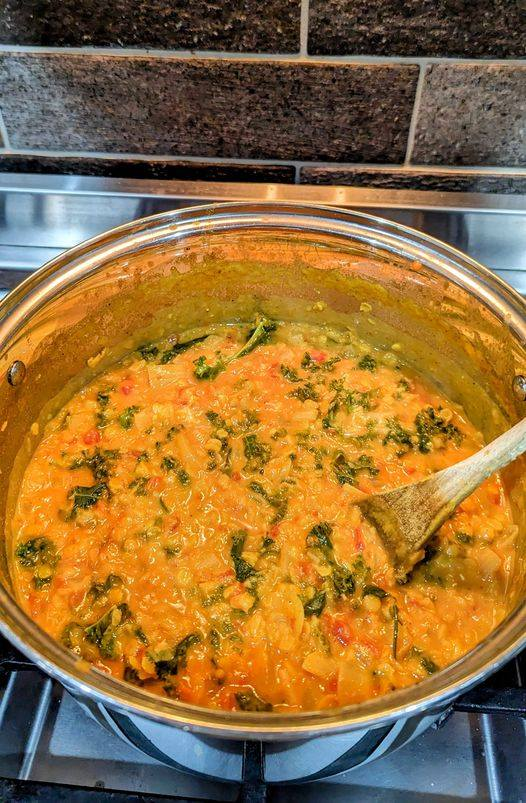Recipe:
Olive oil
-1 onion finely diced
-4 large garlic clove minced
-Thumb-ish size piece of ginger grated
-1 tsp cumin
-1 tsp garam masala
-1 tsp turmeric
-1 tsp mild Indian curry powder
-1/2 tsp paprika (optional or add more cumin or coriander)
-chilli flakes or powder to taste I used only 1/4 tsp
-1 can 100% coconut milk
-1 can crushed tomatoes
-1 cup split red lentils rinsed well
-2 cups low salt veg broth/stock
-Large handful chopped Kale stems removed
-Handful fresh coriander/cilantro
-Salt to taste
-Lime juice or lemon juice to finish (important ingredient)
Fry the onion in olive oil for 5 minutes then add the ginger and garlic for another minute. Add the spices,stock, lentils, and tomatoes, simmer for about 20 -25 till lentils are tender. Add coconut milk, coriander, kale, lemon or lime juice, salt to taste simmer 5 minutes more till kale is bright green and tender. Serve with rice and roti ![]()
Vegetarian Curry

Vegetarian curry is a culinary delight that bridges the gap between tradition and modern dietary preferences. This flavorful dish, rooted in the rich culinary traditions of South Asia, particularly India, has found a place on dining tables around the world. The essence of vegetarian curry lies in its diverse ingredients, robust spices, and the harmonious blend of flavors that tantalize the taste buds. As more people embrace vegetarianism for health, ethical, or environmental reasons, vegetarian curry stands out as a versatile and nutritious option that caters to a wide range of palates and dietary needs.
The history of curry is as complex and varied as its ingredients. Originating in the Indian subcontinent, the concept of curry has been adapted and embraced globally, resulting in countless variations. Vegetarian curry, in particular, highlights the bounty of plant-based ingredients, from leafy greens and root vegetables to legumes and tofu. This adaptability makes it a perfect fit for different dietary restrictions and preferences, whether you are a vegetarian, vegan, or simply looking to incorporate more plant-based meals into your diet. The spices used in vegetarian curry, such as turmeric, cumin, coriander, and garam masala, not only enhance the flavor but also offer numerous health benefits, making it a wholesome and delicious choice.
One of the key appeals of vegetarian curry is its nutritional profile. Rich in vitamins, minerals, and fiber, vegetarian curry often features a variety of vegetables and legumes, which contribute to a balanced and healthy diet. The inclusion of ingredients like chickpeas, lentils, spinach, and sweet potatoes ensures a high intake of essential nutrients while providing a satisfying and hearty meal. Additionally, the spices commonly used in curry have anti-inflammatory and antioxidant properties, which can support overall health and well-being. For those looking to maintain or improve their health through diet, vegetarian curry offers a delicious and nutritious solution.
Environmental sustainability is another significant reason to embrace vegetarian curry. The production of plant-based foods generally requires fewer resources and generates lower greenhouse gas emissions compared to meat production. By choosing vegetarian options, such as curry, individuals can reduce their environmental footprint and contribute to a more sustainable food system. The ingredients for vegetarian curry, such as locally sourced vegetables and legumes, can often be grown with less environmental impact, supporting the move towards more eco-friendly eating habits. This aligns with the growing awareness and commitment to sustainability in today’s society.
From a culinary perspective, vegetarian curry offers endless possibilities for creativity and experimentation. The dish can be tailored to suit different tastes and dietary preferences, making it an inclusive option for gatherings and family meals. Whether you prefer a mild, creamy curry or a hot, spicy one, the flexibility in ingredients and preparation methods allows for customization to achieve the desired flavor and texture. Adding coconut milk for a creamy texture, incorporating a variety of vegetables for a colorful and nutritious meal, or adjusting the spice levels to cater to different palates are just a few ways to personalize vegetarian curry. This adaptability ensures that vegetarian curry remains a beloved dish in diverse culinary traditions.
The cultural significance of vegetarian curry cannot be overstated. It is a staple in many Indian households and is often associated with festivals, celebrations, and communal meals. The preparation and sharing of curry can be a deeply social and cultural experience, fostering a sense of community and connection. As vegetarianism gains popularity worldwide, the cultural exchange surrounding dishes like vegetarian curry promotes greater understanding and appreciation of different culinary traditions. This global culinary exchange enriches the food culture, bringing people together through shared meals and experiences.
In conclusion, vegetarian curry embodies the perfect blend of tradition, nutrition, and sustainability. Its rich flavors, health benefits, and adaptability make it a valuable addition to any diet, whether you are a seasoned vegetarian or exploring plant-based options for the first time. As a dish that has evolved and been embraced by cultures around the world, vegetarian curry represents the best of what global cuisine has to offer. Its popularity continues to grow, driven by a collective movement towards healthier, more sustainable, and ethically conscious eating habits. Whether enjoyed at home, in a restaurant, or as part of a cultural celebration, vegetarian curry remains a timeless and beloved dish that nourishes both the body and the soul.
4o
